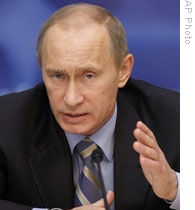VOA慢速英语 2008 1227
时间:2018-11-27 作者:英语课 分类:VOA慢速英语2008年(十二)月
For much of the year, record prices for oil have made oil-producing nations rich. Now these nations are trying to cut production to support collapsing 1 prices.
Last week, the Organization of Petroleum 2 Exporting Countries met in Algiers. Members agreed to a record production cut of more than two million barrels a day, or about five percent of world output. OPEC's president said the group may call an emergency meeting in March if prices continue to fall.

An oil worker at Saudi Arabia's Khurais oil center. Operations at the center were expanded as oil reach 140 dollars a barrel.
Less than six months ago, oil traded at a record one hundred forty-seven dollars a barrel. Governments and oil companies in Russia, Brazil and Saudi Arabia spent billions of dollars to develop new oil fields. Now, oil is trading for less than forty dollars a barrel—down over seventy percent.
At the root of the sharp price decrease is reduced demand because of the economic downturn. The American Petroleum Institute says demand for oil in the United States fell by three percent in the first half of the year compared to the same period last year. Americans are driving smaller, more fuel efficient cars. And they are driving less.
Last week, the Energy Information Administration released a report on oil use in the United States. The Annual Energy Outlook for Two Thousand Nine predicts that American oil use will remain mostly unchanged through the year twenty thirty. The report says new fuel efficiency rules for vehicles, requirements for increased use of renewable fuels and increased fuel prices will limit demand. The United States is the world's largest user of oil.
Collapsing oil prices mean producing nations will face something they may not have planned for: budget deficits 4. Saudi Arabia is the world's largest oil exporter. But it expects a budget deficit 3 in two thousand nine — its first in six years.

Russian Prime Minister Vladimir Putin at a meeting of the Gas Exporting Countries Forum 5 in Moscow Tuesday
Russia, the world's second largest exporter, also predicts a budget deficit next year. Some nations depend on oil exports more than others. For example, oil provides eighty percent of Iran's foreign income.
Oil was not the only energy resource in the news recently. Russian Prime Minister Vladimir Putin warned that a period of low natural gas prices is coming to a close. Mister Putin spoke 6 at a meeting of the Gas Exporting Countries Forum in Moscow. The fourteen-member group includes Russia, Iran and Venezuela.
Currently, natural gas is transported through pipelines 7 under long-term contracts. This limits the prices suppliers can charge. But the new process of liquefying natural gas may change that. Mister Putin said liquefied natural gas has become an expanding industry that requires new investment in processing centers.
Venezuela's Energy Minister Rafael Ramirez said the Gas Exporting Countries Forum will have more power over prices as the world market becomes more developed.
And that's IN THE NEWS in VOA Special English, written by Mario Ritter. I'm Steve Ember.
- Rescuers used props to stop the roof of the tunnel collapsing. 救援人员用支柱防止隧道顶塌陷。
- The rocks were folded by collapsing into the center of the trough. 岩石由于坍陷进入凹槽的中心而发生褶皱。
- The Government of Iran advanced the price of petroleum last week.上星期伊朗政府提高了石油价格。
- The purpose of oil refinery is to refine crude petroleum.炼油厂的主要工作是提炼原油。
- The directors have reported a deficit of 2.5 million dollars.董事们报告赤字为250万美元。
- We have a great deficit this year.我们今年有很大亏损。
- The Ministry of Finance consistently overestimated its budget deficits. 财政部一贯高估预算赤字。 来自《简明英汉词典》
- Many of the world's farmers are also incurring economic deficits. 世界上许多农民还在遭受经济上的亏损。 来自辞典例句
- They're holding a forum on new ways of teaching history.他们正在举行历史教学讨论会。
- The organisation would provide a forum where problems could be discussed.这个组织将提供一个可以讨论问题的平台。